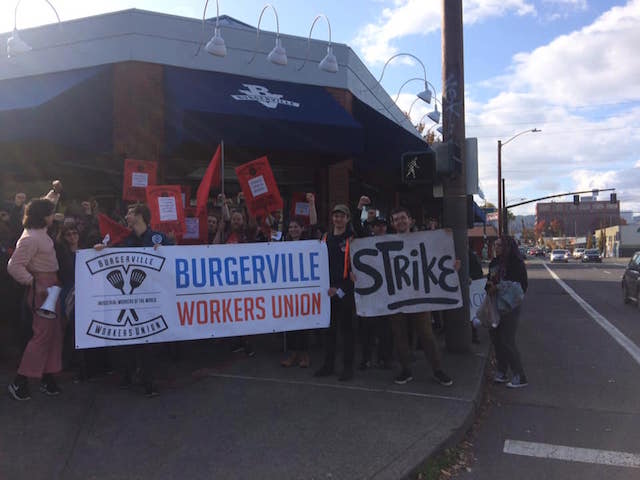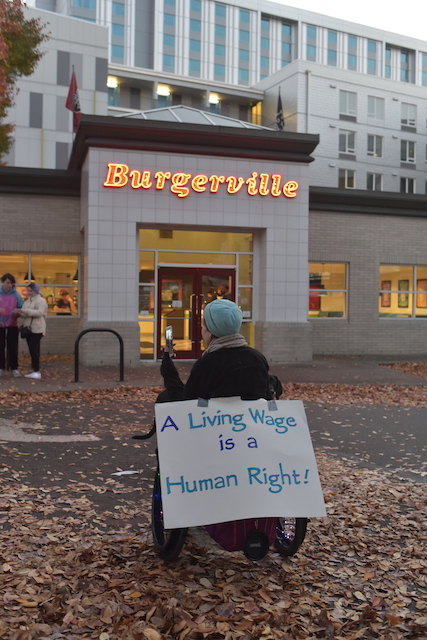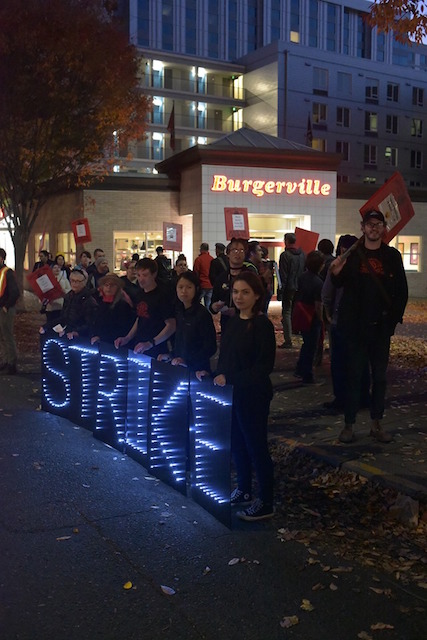
Story by Pete Shaw
On Wednesday October 23, Burgerville workers throughout Portland walked off the job and launched the largest strike in the history of the Burgerville Workers Union (BVWU). Workers from the Convention Center, 92nd and Powell, Hawthorne, and Montavilla Burgerville locations walked off the job Wednesday morning, saying they would remain on strike until they had “sufficiently demonstrated their strength to the company.”
The BVWU and Burgerville management have been locked in contract negotiations for the past 16 months, and while they have made progress on several issues, including tips, holiday pay, and protections for workers without documentation, the remaining major point of contention surrounds workers’ wages. At negotiations the week prior to the strike, management offered all Burgerville employees an hourly wage increase of $1.00 that would begin at the end of this year, a far cry from the living wage that union members believe all Burgerville workers deserve. Beginning December 30, workers would begin making a minimum of $13.50 an hour, plus tips, which according to Burgerville management can range from $0.82 to $4.24 an hour, depending on location.
That base wage is neither impressive nor generous. For workers in Burgerville’s 15 Washington State locations, who by state law must be paid a minimum wage of $13.50 an hour starting January 1, 2020, the raise is nearly negligible, its value dependent on tips. Oregon’s minimum wage will jump to $13.25 an hour in the three Portland Metro counties and $12.00 an hour elsewhere on July 1, 2020. As the BVWU noted, come July 1, the raise will amount to just $0.25 an hour. Furthermore, for workers who already make just a couple of dollars above minimum wage, Burgerville’s raise might mean nothing at all. One worker was told they already made “too much” money to receive the offered wage increase that management claimed everyone would gain.

“Burgerville’s latest wage proposal is intolerable, and light years away from a real raise: it basically just offers workers the minimum wage increase six months early,” said the union. “We remain ready to reach an agreement, and we’re willing to make concessions to win a contract that significantly improves the lives of Burgerville workers. But Corporate’s recent wage proposal doesn’t do that. Instead, it drags out the same status quo that’s kept us all working and living in poverty for years.”
Regardless, the company that projects itself as respecting and cherishing local values, clearly does not value the well-being of the workers it often refers to as the beating heart of the company. “Workers at both ends of that pay scale,” the union stated, “continue to struggle to afford their bills, have to scrape together time to spend with their families, and live without savings.”
For a long time, organizing fast food workers was considered impossible. Sometimes the impossible takes a while. The BVWU had its coming out party in April 2016, and two years later it became the only formally recognized fast food union in the United States when the Southeast 92nd and Powell store approved granting themselves federally recognized union status. Soon, workers at four other locations, including the one in Gladstone, also joined up.
Of course, organizing a union and making material gains from that organizing are two different issues. But the BVWU has consistently offered a textbook approach to organizing. The current strike was not called out of desperation, but rather was a fallback option because of how methodically union members have gone about the hard, grinding, and often unheralded and unseen work of organizing. When a couple of years ago the union called for a boycott of Burgerville, it had already laid a substantial groundwork of support composed of numerous labor groups, community organizations, faith groups, and concerned individuals, all of whom understood the old adage that when workers do better, workers do better.
Wednesday night marked the opening of the Portland Trail Blazers’ season, and the Convention Center Burgerville was clearly expecting a large crowd. Despite the strike having either shut down or brought to a trickle traffic at the other three locations on strike, the Convention Center store was being helmed by at least eight people whom one employee of the store said were almost all managers from other locations. Unlike the BVWU which has relied on its organizing, Burgerville management apparently assumed that Blazers fans would simply cross the BVWU’s picket lines.
They were not entirely wrong. At one point between 5 and 7 PM, there were 15 customers in the store, although a few of them seemed to stay for the duration. And one car crossed the line, its driver not going to grab food, but rather call the police because he was apparently upset about the picket line. When the officer arrived, he had little to offer the man. No shake. No fries. Just a helpless shrug.
On the other side of Northeast Multnomah Street, large contingents of fans wearing jerseys bearing the names of heroes current and past–Lillard and McCollum, Drexler and Porter, Walton and Lucas–wandered toward the Rose Garden. This Burgerville has been the sight of many union actions, which always include an element of education. At least eight other drivers beyond the man who had been scandalized by the picket line continued on their way after union members explained why the workers were on strike. Far more honked and voiced their support for the union.
It was at first thought an odd sight. 19,991 people attended the game. Not all of them passed by Burgerville, but a substantial number did, as they have on other game nights when the union has picketed that store. But it made sense. Unlike Burgerville management, which apparently believes that turning things over to what the union calls a “high priced anti-union lawyer” is what passes for effective organizing, the workers and their supporters have done such deep outreach in the community, that very few fans even considered the idea of approaching the store while there was a picket line.
In a corporate statement issued on October 23, Burgerville CEO Jill Taylor proclaimed the company’s usual pabulum regarding its image as “a 58-year-old, locally owned and operated company that invests in the entire region through our employees, our communities, and our farmers and ranchers.” Regarding the strike, Taylor stated, “The union can walk away, but we’re not. We will be here tomorrow and the next day and the next day working hard for our guests, our employees, and our region.”

Her words were cause for laughter–and derision–from union members. Abby from the Hawthorne store noted that Taylor has only shown up once to a bargaining session, on May 1 of this year, issuing a 20 minute “speech saying complete nonsense,” before getting up and leaving the negotiations without fielding questions or even expressing interest in discussion. Others were more colorful in their description of Taylor’s talk, calling it “batshit crazy” and “cuckoo bananas shit.”
Those more floral analyses are perhaps too kind. According to the union, here are some of her more choice comments:
–“There are about 50 harvests left in the world. the mission of Burgerville is to tie our business to the soil.”
–“Do you know why you’re here and what purpose you serve? Preventing you from being a member of the useless class. We’re doing work to tie people to their souls. We’re not in war against classes, cultures, civilizations. We’re in a war about what it means to be human.”
–“Based on our research, paying $15 an hour means workers will be taking home less pay.”
Wednesday night’s picket at the Convention Center Burgerville was advertised as a Halloween-themed event. Workers and supporters were encouraged to come in costume, with a prize being offered to the person whose costume “spooks the boss the most.” A clear contender would have been the person who dressed up as all sorts of greens and vegetables, Taylor’s gibberish written upon them. Alas, perhaps because it was just far too weird even for Halloween, nobody showed up as a Taylor Word Salad.
After the picket rally, Marc Medina of the Southeast 92nd and Powell store wryly noted that he thought the action might have been a success. And in the days that have followed, greater numbers of people have shown their support, routinely shutting down the various stores they have picketed.
That backing now includes even more Burgerville workers. Medina said that management sent workers an email regarding its wage offer which for reasons that remain unclear, derided the union’s original demand of a wage increase of $5 an hour. Not surprisingly, said Medina, other Burgerville workers thought the union’s demand was a good one, and he expressed some surprise that management had been so clumsy.

“They thought that was a negative on our part,” he said. “I don’t know why they thought that was a negative. I guess they thought that workers were naturally going to be demanding compromise and minimal effort. We made it very clear, we will move forward on a contract if they’re willing to move on wages. And if they’re not, then we’ll have more of this. I don’t think we lose anything by waiting. I think we get stronger by the day. Ever since that email the company sent to workers, we’ve had more messages from workers across the company reaching out to organize than we’ve had in months. I think that it’s revitalized us internally, and I think this is exciting, a lot of fun. And I think workers are more motivated now than they’ve ever been, to be more militant, and to take seriously the efforts of fighting collectively.”
On Wednesday night, Medina placed the BVWU’s struggle in its larger picture of all workers’ struggles for justice in the workplace. “This is the endgame,” he told the workers and their supporters. “This is when we have to fight the hardest we can to get this contract. Many workers are right now are looking to the community, looking to all of you on these picket lines, looking for encouragement, looking for a reason to take on the next day. Getting ready for the strikes to come. Ready for for the actions and the escalations. And when they see you out here on this picket line, they get pride. They can hold their heads high.”
Update: By the night of Saturday October 26, Burgerville management had seen enough empty tables and drive-thrus due to the BVWU’s strike and the backing it received from its supporters. Mangagement, which previously described last week’s wage offer as its best and final one, agreed to return to negotiations. Workers in turn went back to work at, as the union described it in a Facebook post, both “our stores, and at the bargaining table.”
“Faced with our collective power,” the BVWU’s post continued, “Burgerville is ready to actually negotiate with us over wages, and it feels like we have a real path forward towards a fair contract and a living wage.”
Want to get involved? The BVWU’s call for a boycott of Burgerville remains in place. For more information, go to: https://www.facebook.com/burgervilleworkersunion/?epa=SEARCH_BOX
Thanks to Stan Detz for his help on this article.






